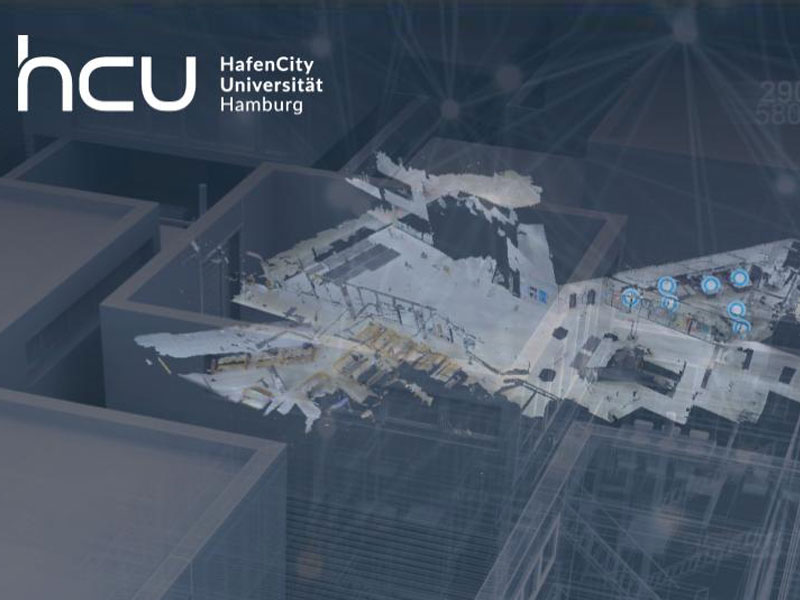Cooperation with the Digital City Science Group of the HCU about the creation the Digital City Twin
February 11, 2021: What is the added value and the character of a Digital City Twin?

What is the added value and the character of a Digital City Twin? The digitalization of the construction and real estate industry opens up new areas of digital data streams and intelligent information environments.
This industrial revolution creates new dimensions in the interaction between the real and the digital city and its generations of residents. The Digital City Twin is the digital mirror image of the city and the result from the synergies of the Professorship of the Digital City Science at HafenCity University Hamburg (HCU) and NUCE Consulting GmbH. While the HCU, with its research field of expertise in Digital City Science, is a scientific landmark in the development of all topics for the digital cities of tomorrow, NUCE Consulting GmbH has extensive experience in digital transformation through BIM and digital twins as well as direct input from the Economy.
Prof. Dr.-Ing. Jörg Rainer Noennig from HafenCity University Hamburg researches and promotes innovations that further develop the changes in cities in the context of digitalization. The connection of technical issues in the context of societal, social and cultural developments is one of the main points.
In order to make cities healthier, more livable and more efficient in the future, digital city science uses urban data and develops new tools and digital city models on this basis. This form of the new digital tools enables the visualization and simulation of complex urban developments and interactions and supports urban actors in decision-making processes.
The city of Hamburg is the “Living Lab”, in which urban change processes are comprehensively researched and developed through to specific, usable applications. In addition, the research group at the HCU cooperates with the City Science Group of the MIT Media Lab (Cambridge / USA). The research network also includes partners from the public, academic and private sectors.
From the practice of numerous pilot projects of NUCE Consulting GmbH in the field of BIM2field and BIM2FM under the direction of Dipl.-Ing. Milos Mikasinovic also created a first use case of a building scanning using the example of the HCU Lab and made it available to the university. In the spirit of the Living Lab, these forms of pilot projects for the direct application of digitization of existing buildings are to be further expanded and continued with further use cases within this pilot project. The aim is the direct implementation of digital transformation in tangible and usable results.
The link to the web-based building scanning is available here: Open web-based building scanning
As part of the winter seminars of the 2019/20 winter and the 2020 courses with topics around the areas of the Digital City Twin were launched. In order to convey the content in a practical way, it was also developed in various workshops. From the basic systematics and digital data structure to the development of digital twins from the BIM working method, the urban social aspects were also considered. Digital building models using BIM standards can, but do not have to, form the basis for the Digital City Twin. The result of the seminar is the elaboration of various papers by the students on individual topics in the area of the process chain of digitization and digitalization of urban space. The abstract forms the basis for further developing the topic at regular intervals based on the coming developments in this fields. The aim is to extract the upcoming standards of the Digital City Twin using a series of considerations and elaborations.
The seminar speakers were Dr.-Ing. Jörg Rainer Noennig (Professor Digital City Science / HCU), Dipl.-Ing. Milos Mikasinovic (BIM-Expert & GF / NUCE Consulting GmbH), Agota Barabás (Assistant Digital City Science / HCU) and Taha Hatcha (PhD student, Digital City Science / HCU)
The following core principle was worked out in the courses as the basic principle of the Digital City Twin:
“The Digital City Twin is a digital replica for simulating complex, cross-scale urban development processes based on socio-spatial data and human dynamics.”
On the basis of this “mantra”, the Digital City Twin should be further established. We build on digital!
“Together we are researching, developing and working on our concept of the Digital City Twin – and aiming for the first real implementations in the coming months and years. We are convinced that the digital city twin will fundamentally change our understanding of the city and architecture.”
Dr.-Ing. Jörg Rainer Noennig

